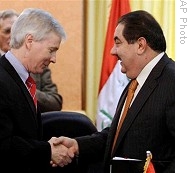voa标准英语2008年-Iraqi Parliament Debates New US Military Pact(在线收听)
Iraq's parliament began deliberations on a new military pact with the United States, which is to replace a U.N. mandate that expires December 31. The Iraqi Cabinet approved the pact Sunday, after a bitter and protracted debate and the obstruction of several influential Shi'ite leaders.
The text of the agreement was read to Iraqi legislators, before the special session of parliament was adjourned. More than two-thirds of Iraq's 275-member parliament attended the session, despite calls from anti-U.S. Shi'ite cleric Muqtada al Sadr to obstruct debate.
The pact is scheduled for a vote on November 24.
 |
| U.S. Ambassador Ryan Crocker, left, and Iraqi Foreign Minister Hoshyar Zebari, right, shake hands after signing ceremony for security pact in Baghdad, 17 Nov 2008 |
Earlier, U.S. Ambassador Ryan Crocker and Iraqi Foreign Minister Houshiar Zebari signed the accord. Ambassador Crocker saisd the new pact would be the cornerstone of U.S.-Iraqi relations for "economy, culture, science, technology, health and trade."
Foreign Minister Zebari addressed the concerns of many Iraqis, saying the government had gotten the best possible deal in its negotiations with the United States:
He says most important was the Iraqi negotiating team's skill in arriving at a final date for the withdrawal of U.S. troops. No clear date was set, before this pact, he says, and everyone was putting out conflicting signals, but now the government has hammered out a final accord.
Firebrand Shi'ite cleric Muqtada Sadr has threatened to withdraw his 30 members from parliament in a bid to obstruct that body's vote to approve the deal.
But Iraq's revered top Shi'ite authority, Grand Ayatollah Ali Sistani gave his blessing to the new pact, several days ago, saying he would not object if it was approved by a substantial majority in parliament.
Analyst Paul Salem of the Beirut-based Carnegie Center for Peace in the Middle East describes the logistical achievement of concluding the new Iraqi-U.S. military pact.
"There was a clear common interest, there, but the great difficulty was the political situation in Iraq, and I think there is still a bit of a challenge," said Paul Salem. "It was an achievement that Maliki was able to get it through the government. That is a good sign he should be able to get it through parliament. It indicates, I think, that Nouri al Maliki himself is more in control of the situation."
Neighboring Syria, which has long opposed the U.S. presence in Iraq, slammed the new accord, calling it a "surrender" to U.S. interests.
But Iran's judiciary chief, Ayatollah Mahmoud Hashemi Shahroudi, said the Iraqi Cabinet acted "very well" in approving the pact. Shahroudi is reportedly very close to Iran's top leader, Ayatollah Ali Khamenai.
The Website of Iran's state television quoted Shahroudi as saying he hoped the United States will withdraw from Iraq within the time specified in the deal. A television commentary called it "a victory" for Iraqi Prime Minister Nouri al-Maliki's government.
The Iranian government has long expressed opposition to the pact, arguing that a continued U.S. presence in Iraq undermines its own security and stability.
Analyst Salem says he does not think Tehran will attempt to scuttle the deal, especially after its previous history of reining in ally Muqtada al Sadr.
"Iran has sort of pulled back Muqtada al Sadr in 2007, and in general the Iranians have been playing the double game of wanting the Americans to stay long enough to secure the situation, but also to be uncomfortable enough to seriously commit to leaving at some point," he said.
Al-Sadr is calling for a popular protest against the accord Friday in Baghdad.